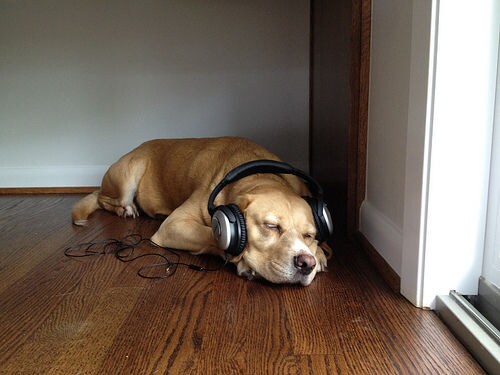Does music play an integral role in your life? Perhaps you love listening to mellow tunes during your morning commute or classical music before you go to bed. Whatever your preference, it’s clear that different genres and tempos of music evoke different emotions in your mind. Interestingly, music affects dogs in similar ways. Here’s everything you need to know about the relationship between dogs and music.
Do Dogs Like Music?
Dogs like music, too, but the type of music makes all the difference! “Slower tempos, simpler patterns and lower frequencies discharge the canine nervous system,” says Lisa Spector, a co-founder of “Through a Dog’s Ear.” In contrast, “faster tempos, more complex music (often with a multitude of instruments) and higher frequencies charge the canine nervous system.”
This finding was confirmed in “The influence of auditory stimulation on the behaviour of dogs housed in a rescue shelter,” an “Animal Welfare” study published in 2002. In the study, shelter dogs were found to be more relaxed and quiet when they were listening to classical music. The dogs didn’t seem particularly interested in pop music or radio shows but exhibited more barking when heavy metal was playing.
https://www.youtube.com/watch?v=uH-RtMpy-8Q
How Can You Use Music With Your Dog at Home?
Music is most commonly used as a tool to help dogs who suffer from anxiety issues, including separation anxiety when you leave him with a sitter and anxiety caused by outside noises and other forces, such as thunder, construction and fireworks. If you have a particularly hyperactive dog, you can also play music in an effort to keep her calm. “Studies show that classical music has a calming effect on most dogs and heavy metal elicits stress-related behaviors,” says Brad Waggoner, a certified professional dog trainer at Cold Nose College in Murphy, North Carolina.
In order to ensure that your dog has a positive association with music, start by playing songs during moments when she is in a calm, happy state, such as during meal time. According to Waggoner, it’s crucial that you do not allow the music to become a predictor of a stressful situation, as you may then run the risk of your dog associating the sound with a coming stressful event. Once you establish the positive association, you should gradually introduce music when your dog’s stressor is present. “When this is done incrementally, it doesn’t take long for a dog to build that association,” says Spector. If you follow these steps, music can work as a security blanket that brings your dog comfort during times of stress.
You can also incorporate music into your dog’s life in other exciting ways. For instance, according to Waggoner, classical music can also be used to help keep your dog calm and focused in a training environment. Soothing tunes can help your furry friend recuperate when he’s sick or recovering from surgery, while upbeat tempos can help perk him up when he’s feeling blue. Best of all, “enjoying the music together can create a beautiful human and canine emotional bonding experience,” says Spector.
Now you know the answer to the question, “Do dogs like music?” But you might be wondering if your furry friend will approve of the songs in your personal music collection. Have no fear, as there are currently dozens of available music collections that have been created specifically for dogs! You can even find free songs on a variety of different YouTube channels, such as Relax My Dog.

And read New Music That Will Calm Your Dog.
Rebecca Desfosse is a freelance writer who specializes in parenting, family and pet care topics.

